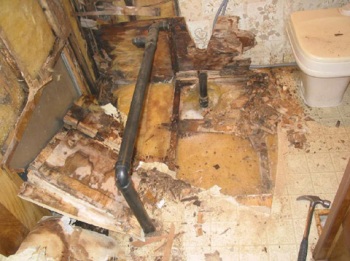Water – It’s flowing all through our home as we speak, and we usually don’t even think twice about it…
… until a leak suddenly appears, or we can smell dampness in the home. What if you returned from the office or vacation, only to find your lounge room half full or water? This water will soak in by the second!

If this water damage isn’t dried out properly, the structural integrity of your home will be compromised, as will your health.
Your insurance policy would usually help out in this situation, so if you’ve had water damage in your home recently, you should get the backside of your walls checked using infrared to give you a better idea if the moisture did actually dry out properly. Unless you ripped out all your walls in the area at the time, then you can’t be too sure.
How can you slow down the flow in an emergency?
Firstly, you should always know where the main shut off to your water supply is in the event of water damage or flood in the home.
You then need to identify where the water actually came from that caused the water damage… and call a plumber right away. If you find that the water has come from a toilet area, you need to wear protective clothing, as you may come in contact with bacteria in the sewerage due to backflow. It may be best to call in a professional to mop up the mess if bacteria is involved.
A common mistake some people make is assuming they can dry things out by turning up the heating system. Too much heat can actually draw the moisture out of some surfaces fast, resulting in further ‘secondary’ damage such as cracking, splitting and warping. This is common with artwork, wooden furniture and some musical instruments that have a very low moisture content to start with. All of these items will absorb moisture rapidly and are vulnerable to the effects of heat and rapid drying.
Who can help with water damage?
You would normally call on a professional in this situation. Typing ‘water restoration’ into the yellow pages, or talking to your insurance company for guidance is the quickest option. If your insurance company refers a professional to you, that’s a good sign that they have dealt with that tradesperson in the past.
Once you think it’s all dried out, you should then call us. We will do an infrared thermal imaging scan on your home to find any traces of leftover moisture.
Contact us today!






